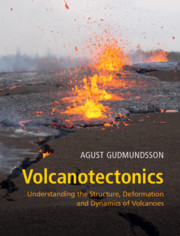Book contents
- Volcanotectonics
- Volcanotectonics
- Copyright page
- Contents
- Preface
- Acknowledgements
- 1 Introduction
- 2 Volcanotectonic Structures
- 3 Volcanotectonic Deformation
- 4 Volcanic Earthquakes
- 5 Volcanotectonic Processes
- 6 Formation and Dynamics of Magma Chambers and Reservoirs
- 7 Magma Movement through the Crust: Dike Paths
- 8 Dynamics of Volcanic Eruptions
- 9 Formation and Evolution of Volcanoes
- 10 Understanding Unrest and Forecasting Eruptions
- Book part
- Index
- References
10 - Understanding Unrest and Forecasting Eruptions
Published online by Cambridge University Press: 18 April 2020
- Volcanotectonics
- Volcanotectonics
- Copyright page
- Contents
- Preface
- Acknowledgements
- 1 Introduction
- 2 Volcanotectonic Structures
- 3 Volcanotectonic Deformation
- 4 Volcanic Earthquakes
- 5 Volcanotectonic Processes
- 6 Formation and Dynamics of Magma Chambers and Reservoirs
- 7 Magma Movement through the Crust: Dike Paths
- 8 Dynamics of Volcanic Eruptions
- 9 Formation and Evolution of Volcanoes
- 10 Understanding Unrest and Forecasting Eruptions
- Book part
- Index
- References
Summary
One of the main aims of the science of volcanology, and that of volcanotectonics in particular, is to understand volcanic unrest periods. By ‘understanding’ I mean that the signals coming from the volcano during the unrest can be interpreted in terms of plausible physical and chemical processes occurring inside the volcano. By volcanic ‘unrest’ we mean an increase in various physical and chemical signals, suggesting that associated processes within the volcano operate at different rates, intensities, or both. By interpreting the unrest period in terms of correct physical processes, there is a chance of assessing the volcanic hazard, namely the probability that the unrest period results in an eruption. Furthermore, when the understanding of the processes giving rise to the signals is accurate, not only the location of the eruption site but also the likely size (volume) of the eruption can be forecasted.
- Type
- Chapter
- Information
- VolcanotectonicsUnderstanding the Structure, Deformation and Dynamics of Volcanoes, pp. 472 - 559Publisher: Cambridge University PressPrint publication year: 2020

